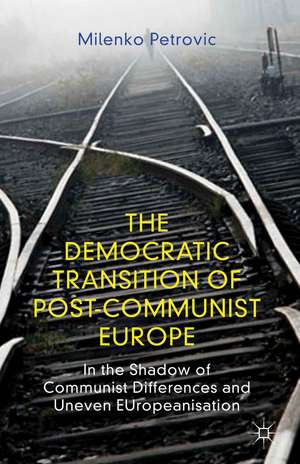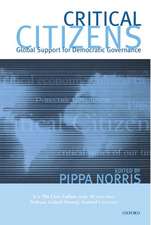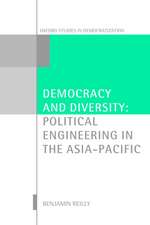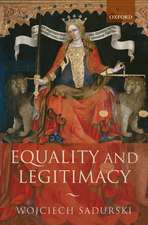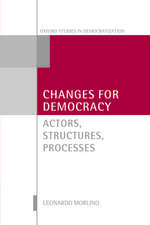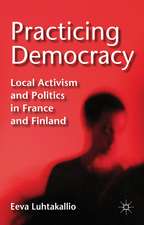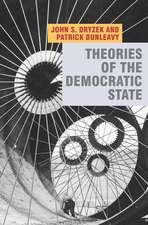The Democratic Transition of Post-Communist Europe: In the Shadow of Communist Differences and Uneven EUropeanisation
Autor M. Petrovicen Limba Engleză Hardback – 12 iul 2013
| Toate formatele și edițiile | Preț | Express |
|---|---|---|
| Paperback (1) | 381.43 lei 6-8 săpt. | |
| Palgrave Macmillan UK – 2013 | 381.43 lei 6-8 săpt. | |
| Hardback (1) | 384.86 lei 6-8 săpt. | |
| Palgrave Macmillan UK – 12 iul 2013 | 384.86 lei 6-8 săpt. |
Preț: 384.86 lei
Nou
Puncte Express: 577
Preț estimativ în valută:
73.64€ • 77.16$ • 60.88£
73.64€ • 77.16$ • 60.88£
Carte tipărită la comandă
Livrare economică 11-25 aprilie
Preluare comenzi: 021 569.72.76
Specificații
ISBN-13: 9780230354319
ISBN-10: 0230354319
Pagini: 196
Ilustrații: XX, 196 p.
Dimensiuni: 140 x 216 x 15 mm
Greutate: 0.34 kg
Ediția:2013
Editura: Palgrave Macmillan UK
Colecția Palgrave Macmillan
Locul publicării:London, United Kingdom
ISBN-10: 0230354319
Pagini: 196
Ilustrații: XX, 196 p.
Dimensiuni: 140 x 216 x 15 mm
Greutate: 0.34 kg
Ediția:2013
Editura: Palgrave Macmillan UK
Colecția Palgrave Macmillan
Locul publicării:London, United Kingdom
Cuprins
Foreword – written by Professor Richard J. Crampton Introduction Chapter 1. Socio-Economic and Political Facts on Post-Communist Transition 1.1. The necessity for and uneven distribution of foreign assistance 1.2. The decisive importance of EU assistance 1.3. The rejection of EU conditions and assistance for reform by post- communist governments in the Balkans during the early 1990s Chapter 2. Critique of the Existing Explanations 2.1. Structural explanations based on the impacts of different pre-communist legacies and geographic location 2.2. Explanations based on different institutional and behavioural legacies of communism 2.3. The importance of a combined approach Chapter 3. Differing Aspects of Communism 3.1. The pre-communist past 3.2. The establishment of communist rule 3.3. The character of communist party rule: weak and strong communism 3.3. The socio-economic effects of communist industrialisation and urbanisation 3.4. The role of the church Chapter 4. Differing Regime Changes and Outcomes, 1989-2004 4.1. Peaceful revolutions in East Central Europe… 4.2. …and Balkan 'evolutions' 4.3. Slovenian and Baltic specifics 4.4. The different role of external factors despite the same EU approach Chapter 5. The Changed EU Approach - New Challenges for the Western Balkan States after 2005? 5.1. The emergence of an EU perspective 5.2. The emergence of enlargement fatigue – the disappearance of the EU perspective? 5.3. The problem of political (in)stability and the statehood status disputes Conclusion
Recenzii
In this powerful contribution to the literature on the democratisation of post-communist Europe, Milenko Petrovic's path-breaking study shows that the slower movement towards parliamentary democracy and a market economy in the Balkan states was not in fact the result of some innate political or social inferiority but rather of the significant differences in the nature of communist power in those states.
Richard Crampton, St Edmund Hall, University of Oxford, UK
This impressive account of the different trajectories of the countries in East Central Europe and the Balkans from the pre-communist period through to their highly differentiated EU integration experiences has the hallmarks of a benchmark study. The intricate inter-weaving of economic and political historical threads is unerringly unpicked and exposed to critical analysis by an author with a deep personal and academic knowledge of these countries.
Allan Williams, Faculty of Business Economics and Law, University of Surrey, UK
It is now almost a quarter of a century since the collapse of communist power in Central and Eastern Europe, and the time is ripe for a new, deep analysis of the reasons for the very diverse trajectories in the region. Milenko Petrovic has provided just such an analysis. This is a book that will force scholars to revisit and recast many of the dominant interpretations of post-communist Europe.
Leslie Holmes, Professor of Political Science, University of Melbourne, Australia.
Richard Crampton, St Edmund Hall, University of Oxford, UK
This impressive account of the different trajectories of the countries in East Central Europe and the Balkans from the pre-communist period through to their highly differentiated EU integration experiences has the hallmarks of a benchmark study. The intricate inter-weaving of economic and political historical threads is unerringly unpicked and exposed to critical analysis by an author with a deep personal and academic knowledge of these countries.
Allan Williams, Faculty of Business Economics and Law, University of Surrey, UK
It is now almost a quarter of a century since the collapse of communist power in Central and Eastern Europe, and the time is ripe for a new, deep analysis of the reasons for the very diverse trajectories in the region. Milenko Petrovic has provided just such an analysis. This is a book that will force scholars to revisit and recast many of the dominant interpretations of post-communist Europe.
Leslie Holmes, Professor of Political Science, University of Melbourne, Australia.
Notă biografică
The book convincingly explains the entire transitional process in post-communist states from several angles. It traces both economic and political developments through the prism of history as well as the most recent developments. It casts a new light on the role of communist history in setting the different regional successes in post-communist transition. Unobtrusive, factual and ultimately convincing, the author's argument wins support right from the start.
